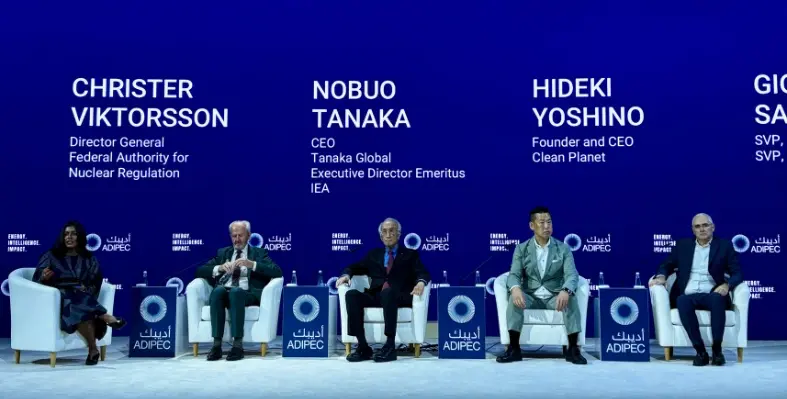As the urgency to reach net zero emissions by 2050 intensifies, nuclear energy has emerged as a crucial pillar in the global transition away from fossil fuels.
At a panel during ADIPEC 2025 titled "Nuclear Energy Opportunities" in the UAE, experts from regulatory, industry, and technology backgrounds explored how advanced nuclear solutions, particularly Small Modular Reactors (SMRs) and fusion technology—can accelerate progress while addressing perennial challenges.
Christa Victorsson, director general of the UAE’s Federal Authority for Nuclear Regulation (FANR), emphasised early engagement with industry and global collaboration as vital for regulatory efficiency and innovation. “Early engagement is very, very essential,” Victorsson encouraged. “Approach us. Come to us if you have any ideas or needs in this topic...Collaboration is the new currency.”
Veteran energy policy expert Nobuo Tanaka, CEO of Tanaka Global and former executive director of the International Energy Agency, spoke to the complex public perception issues nuclear must overcome, especially after events like Fukushima. Tanaka highlighted, “There are three major conditions for deploying new technologies: safety or risk minimisation, waste management, and addressing proliferation risks.” He stressed that public trust depends on transparent communication about how new reactor designs can make nuclear power safer and more sustainable.
Enhancing energy security
On the frontier of clean energy technology, Hideki Yoshino, CEO of Clean Planet in Japan, introduced the promise of solid-state fusion, which his company is working to commercialise. “Our type of fusion makes abundant scalable energy, with no CO2 and no radiation,” Yoshino explained. He envisions this technology eventually being deployed everywhere from homes to schools and industries, supporting both decarbonisation and energy security.
Providing a strategic industry perspective, Giovanni Sale, Senior Vice President of Corporate and Business Strategy at MAIRE, outlined the enormous energy demand driven by decarbonisation goals, automation, and the rise of data infrastructure. “SMR in the future, the advanced nuclear reactor, definitely, they need to take a place, because otherwise we cannot match the inspiration that nowadays we can read in any newspaper,” Sale stated. He stressed that SMRs have the flexibility to serve private investors, data centres, and heavy industry alike.
Beyond technical and commercial considerations, the panellists all agreed that robust regulation, international cooperation, and transparent communication with the public are critical to building trust and ensuring proliferation resistance. Victorsson described the UAE’s journey explaining, “Transparency was principle number one. Security, safety, non-proliferation, and long-term sustainability. These are very important principles.”
As the panel concluded, the path forward for nuclear energy became clear: work together globally, communicate benefits and risks openly, and continue developing game-changing technologies like SMRs and fusion. Only then can nuclear fully realise its promise as a safe, scalable tool for a sustainable energy future.
Read more:









